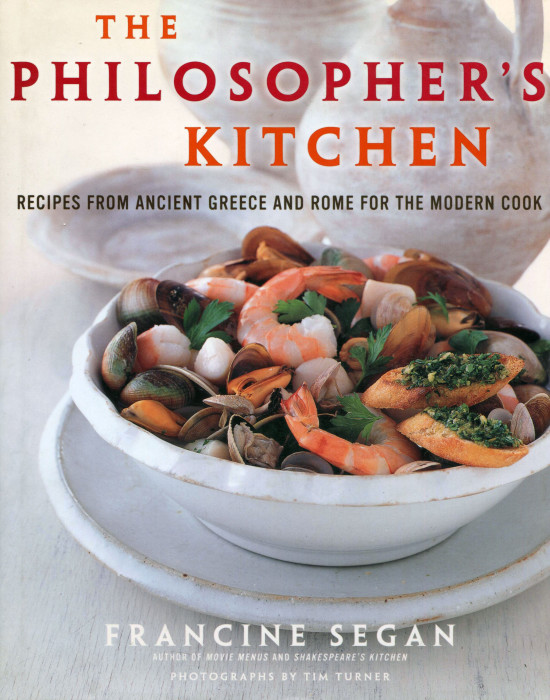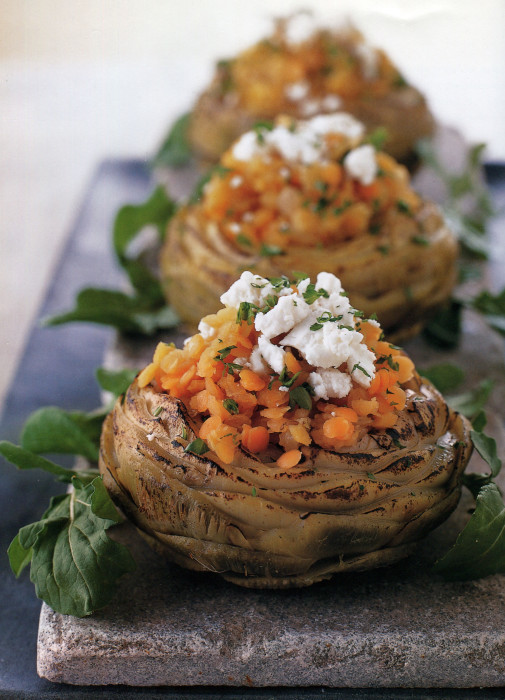With seven cookbooks in her portfolio, Francine Segan is acknowledged as an author with wonderful credentials. She has written several books, including this one, from an historical or cultural perspective. You’d enjoy The Opera Lover’s Cookbook or Shakespeare’s Kitchen Renaissance: Recipes for the Contemporary Cook.
In The Philosopher’s Kitchen: Recipes from Ancient Greece and Rome for the Modern Cook published in 2004, Francine offers us both history and recipes, wonderful recipes reflecting the “culinary state of the art” two thousand years ago. Using Greek and Latin texts, books and letters from the ancient world, Francine has assembled a book telling us about the foods from that very long ago period.
It’s a fascinating journey. In that world, without electricity or refrigerators or blenders, how did people eat? What did they eat? Oh, first, what people are we talking about? The average home cook was not writing down these recipes. Our literature comes from the upper classes, documenting what their staff — very likely including slaves — made for the family. And the ancient documents do often focus on the best dishes: the food of the feasts. Simply put, you can eat really well without electricity.
So the recipes in The Philosopher’s Kitchen come with a definite perspective: these are the best foods of the ancient world.
What are they like? It’s not contemporary New York or Paris. Many of the recipes are simple, no enveloping sauces, no chocolate layers, but conveying their trademarks with a few, carefully balanced notes:
- Acorn Squash with Pine Nuts and Honey
- Marinated Chicken with Date Mustard
- Pea Soufflé with Dill Sauce
- Veal and Fig Stew
The marriage of protein and fruit is evident throughout the book. Some recipes are more complicated with a “longish” list of ingredients to achieve more complex, sophisticated flavors that any modern restaurant, in New York or Paris, would treasure:
- Seared Tuna with Onion-Raisin Marmalade
- Meatballs in Pomegranate Sauce
I’m fascinated by these recipes. The dishes are closely rooted to the land and to the seasons. Remember, no refrigeration. Here you have the epitome of “fresh and local.” I love the Veal and Fig Stew — just imagine the merging of ingredients so perfectly fresh. This is “kill-pick-cut–cook-stir” cuisine where there is no substitute for the immediacy of the ingredients. Despite our "moderness" the fact is that it would be difficult for us to obtain "immediate" ingredients and truly enjoy the taste of real, not refrigerated, freshness that the Greeks and Romans took for granted.
The Philosopher’s Kitchen is easy to read, the recipes well written and readily followed. The book is beautifully packaged with superior photographs that do what is intended — make you say “I want to eat that dish, now.”
Let me close on two notes. First, Francine keeps on writing and she does not always dwell in the past. In fact, her latest book, Pasta Modern: New & Inspired Recipes from Italy, is a journey into the state of the art of pasta. Suzen and I love the book and here’s a link to one of her best recipes, typically Italian in simplicity and abundant flavor:
https://cookingbythebook.com//cookbook-reviews/strings-and-beans-from-modern-pasta/
Second, I really cannot overstate how beautiful and seductive The Philosopher’s Kitchen is. Here’s the photograph for an appetizer, Red Lentils in Garlic-Roasted Artichoke Bottoms. Tell me, can you resist? No, don’t even try. If the ancient Romans could not, why should you?


